|
|
|
Sort Order |
|
|
|
Items / Page
|
|
|
|
|
|
|
| Srl | Item |
| 1 |
ID:
118927
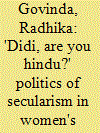

|
|
|
|
|
| Publication |
2013.
|
| Summary/Abstract |
In this paper I take the women's movement as the site for unpacking some of the strains and tensions involved in practical interpretations of secularism in present-day India. Several sources within and outside the movement point out that there has been a tendency to take the existence of secularism for granted, and that the supposedly secular idioms and symbols used for mobilizing women have been drawn from Hindu religio-cultural sources. Women from Dalit and religious minority communities have felt alienated by this. Hindu nationalists have cleverly appropriated these idioms and symbols to mobilize women as foot soldiers to further religious nationalism. Through a case-study of a grassroots women's NGO working in Uttar Pradesh, I seek to explore how women's organizations may be reshaping their agendas and activism to address this issue. Specifically, I will examine how and why the 2002 Gujarat riots affected the NGO, the ways in which it has started working on the issue of communal harmony and engaging with Muslims since the riots, and the challenges with which it has been confronted as a result of its efforts. In doing so, I will show how the complexities of NGO-based women's activism have become intertwined with the politics of secularism.
|
|
|
|
|
|
|
|
|
|
|
|
|
|
|
|
| 2 |
ID:
118266
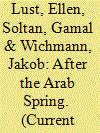

|
|
|
|
|
| Publication |
2012.
|
| Summary/Abstract |
Although Islamism is helping to shape political transitions in the Arab world, this does not foreclose the possibilities of democratization.
|
|
|
|
|
|
|
|
|
|
|
|
|
|
|
|
| 3 |
ID:
140460
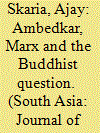

|
|
|
|
|
| Summary/Abstract |
This essay tries to frame one question, which at its most abbreviated can be posed thus: why does Ambedkar convert to Buddhism? Given Ambedkar's militant secularism, to ask this question is also to ask: what assumption of responsibility does that conversion enable which exceeds secular responsibility? This essay tracks how Ambedkar's religion questions both the liberal concept of minority, and the dissolution of the minor that is staged in Marx's critique simultaneously of religion and secularism. Buddhism becomes in the process a religion of the minor.
|
|
|
|
|
|
|
|
|
|
|
|
|
|
|
|
| 4 |
ID:
120051
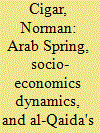

|
|
|
| 5 |
ID:
165238


|
|
|
|
|
| Summary/Abstract |
Through bringing history into conversation with ethnography, this paper re-examines scholarly understandings of Hindu nationalism and the practice of seva (service). Whereas much scholarship addresses Hindu nationalist service through a secular-liberal register, this paper considers what this language excludes. Giving critical attention to elite activists within the Hindu nationalist-led Vanavasi Kalyan Kendra (Tribal Welfare Centre), in Jharkhand, India, my research demonstrates how elite activists translate service into a religious language of somatic representation. This constructs marginal agents as passive subjects of a heavily moralistic ethical-self making project. This critical analysis opens up for study the differing ritual-politics of caste and gender which underlie the participation of marginal actors, practices which are not reducible to a discourse of religion or a universal category of acts. In order to grasp these more complex models, this paper gives importance to the ways in which its ethical discourses are inhabited in manifold ways. This tells a story of how Western models of religion are parochialized, and challenges the relationship between authority and agency which permeate our imagination of non-liberal discourses like those invoked by Hindu nationalist service projects.
|
|
|
|
|
|
|
|
|
|
|
|
|
|
|
|
| 6 |
ID:
123655
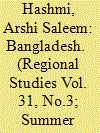

|
|
|
| 7 |
ID:
146845
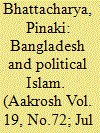

|
|
|
| 8 |
ID:
103850
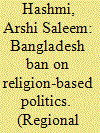

|
|
|
| 9 |
ID:
113396
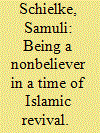

|
|
|
|
|
| Publication |
2012.
|
| Summary/Abstract |
Looking at the trajectories of people of Muslim origin in Egypt who express religious doubts, I argue in this article that doubt and nonreligiosity are not necessarily a child of a Christian genealogy of the secular and definitely not alien to Muslims. Instead, we have to understand them as an intimate moral discontent with the contemporary age of Islamic revival, even if their shape and some of their positive claims are borrowed from notions of Western origin and global currency-most notably, human rights and feminism. There are reasons and ways to become a nonbeliever in a society profoundly affected by a religious revival, and these reasons and ways can be telling about the nature of doubt and certainty in general. They also offer a perspective on the problematic of secularism that focuses on issues of belief and existential trust rather than governmentality and discursive power.
|
|
|
|
|
|
|
|
|
|
|
|
|
|
|
|
| 10 |
ID:
096471
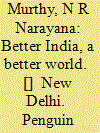

|
|
|
|
|
| Publication |
New Delhi, Penguin Books, 2009.
|
| Description |
xxviii, 290p.
|
| Standard Number |
9780143068570, pbk
|
|
|
|
|
|
|
|
|
|
|
|
Copies: C:1/I:0,R:0,Q:0
Circulation
| Accession# | Call# | Current Location | Status | Policy | Location |
| 054982 | 330.954/MUR 054982 | Main | On Shelf | General | |
|
|
|
|
| 11 |
ID:
122050
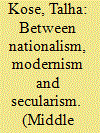

|
|
|
|
|
| Publication |
2013.
|
| Summary/Abstract |
This study discusses the position of Alevi identity and Alevi community with regard to the Turkish national identity-building project. There was a partial compatibility between the Kemalist objective of laicization and nation building and the Alevi practice and understanding of a 'local' version of 'Turkish Islam'. Besides these compatibilities, Alevis faced the challenges of nation-building and homogenization policies, which involved homogenization in ethnic, religious and sectarian domains. Kurmanji- and Zazaki-speaking ethnically Kurdish/Zaza Alevis of Eastern Anatolia had a different experience during the project of centralization and ethnic homogenization, in comparison to Turkish-speaking Turcoman Alevis. This different experience still is a source of division among Alevi communities.
|
|
|
|
|
|
|
|
|
|
|
|
|
|
|
|
| 12 |
ID:
073321


|
|
|
|
|
| Publication |
2006.
|
| Summary/Abstract |
A significant portion of the current debate on secularism has focused on Nehru's role in conceptualizing and institutionalizing this concept. Supporters of the Nehruvian legacy of secularism applaud him for adopting this policy and for establishing communal harmony. Critics hold Nehru responsible for the problems associated with secularism. This article assesses the significance and consequences of Pandit Nehru's contributions to secularism by carefully examining the track record of his government in this area. My main argument is that Nehru deserves credit for introducing secularism to a people who were inured to discriminatory, anti-minority views and practices for centuries. However, he failed to institutionalize this policy in the polity and civil society. I posit that though Pandit Nehru faced formidable opposition to his secular policies from Hindu conservatives within the Congress and the Hindu nationalists outside, he could have pursued several, long-term, non-confrontational strategies for institutionalizing secularism. His failure to do so blemished what would otherwise have been an abiding contribution to Indian multiculturalism.
|
|
|
|
|
|
|
|
|
|
|
|
|
|
|
|
| 13 |
ID:
172449
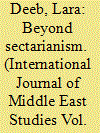

|
|
|
|
|
| Summary/Abstract |
Based on interviews with Lebanese in over 150 mixed-religion marriages and their extended family members, I argue that sect may conceal or stand in for other forms of difference, including ideas about status and hierarchy related to class and regional origin in Lebanon. Because it is the most readily available discourse for understanding social difference, parents often use sectarian rhetoric to describe their concerns about a variety of problems they see in their children's chosen partners. By listening between the lines of parental objections, I suggest that expressions of bias against people of other sects may mask concerns with other forms of social difference, in effect reducing a complex and shifting social field of multiple axes of difference into sect. Rather than assume sectarianism's a priori importance, this approach allows me to bring other discourses of difference and analytic lenses to the foreground.
|
|
|
|
|
|
|
|
|
|
|
|
|
|
|
|
| 14 |
ID:
169997
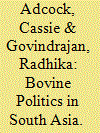

|
|
|
|
|
| Summary/Abstract |
This introduction outlines how the essays in this special section contribute to scholarship on cow protection in India. It argues that they disrupt three powerful framing binaries—religion/economy, legality/illegality and cow-lover/cow-killer—that have tended to dominate the literature on cow protection. Making tangible the analytical limits of these categories, the essays find new critical leverage in the everyday situated relationships between humans, bovines and the state. The essays are distinguished by their attention to bovines as creative and productive forces that are not mere symbols for human politics, but materially embodied and agentive beings that play a significant role in shaping the social and political worlds which emerge around them.
|
|
|
|
|
|
|
|
|
|
|
|
|
|
|
|
| 15 |
ID:
139903
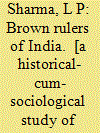

|
|
|
|
|
| Publication |
DelhI, Konark Publishers Pvt Ltd., 1988.
|
| Description |
xii, 154p.hbk
|
| Standard Number |
8122000770
|
|
|
|
|
|
|
|
|
|
|
|
Copies: C:1/I:0,R:0,Q:0
Circulation
| Accession# | Call# | Current Location | Status | Policy | Location |
| 029268 | 954.04/SHA 029268 | Main | On Shelf | General | |
|
|
|
|
| 16 |
ID:
065124


|
|
|
| 17 |
ID:
100317
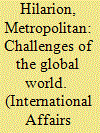

|
|
|
| 18 |
ID:
102112
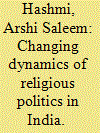

|
|
|
| 19 |
ID:
188944
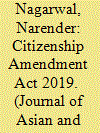

|
|
|
|
|
| Summary/Abstract |
The primary endeavor of this paper is to illuminate the contentious Citizenship Amendment Act 2019 through the constitution and human rights jurisprudence perspective. In this paper, an attempt has been made to propose a different interpretation of the Citizenship Amendment Act 2019 which not only infracts constitutional values but also legalized the hate against minorities, especially Muslims. India—as a nation state—has always cherished and remained concerned about its secular and democratic character. Since independence, India has maintained its global position as a responsible and humane society to protect minorities’ rights and social justice. Shockingly, the legislative development that had taken place in the recent past has questioned India’s commitment toward the certain principle of human rights, democratic values, and secularism which are the hallmark of the Constitution of India. The Citizenship Amendment Act 2019 has put religion as a pre-requisite qualification if someone is desirous to apply for Indian citizenship which is purely a violation of the basic ethos of the constitution. The idea of India as envisioned by the framers of the Indian constitution as a democratic, secular, and socialist state and anything that contrary to its basic structure is unconstitutional. The contentious legislation whether unconstitutional or not needs to be examined through the prism of constitutional law and fundamental norms of human rights. In this research exercise, a modest attempt is made to examine all merits and demerits of this antagonistic citizenship legislation. Throughout the paper, the effort has been given to sustain the notion that India cannot be a republic founded on discrimination, hate, and a pervasive sense of fear.
|
|
|
|
|
|
|
|
|
|
|
|
|
|
|
|
| 20 |
ID:
128481
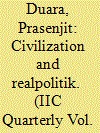

|
|
|
|
|
|
|
|